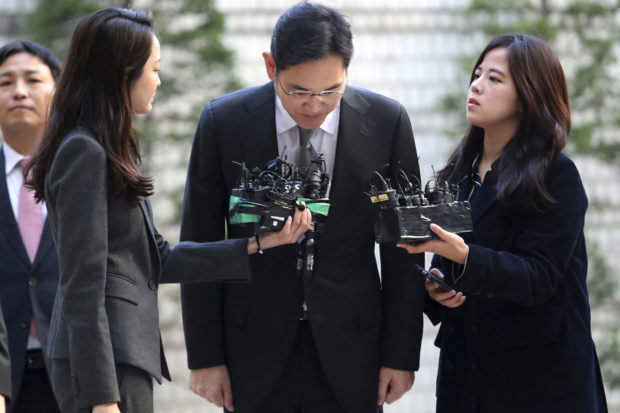Samsung heir Lee appears in court for corruption retrial

Samsung Electronics Vice Chairman Lee Jae-yong bows at the Seoul High Court in Seoul, South Korea, Friday, Oct. 25, 2019. Billionaire Samsung scion Lee appeared in court for a retrial on corruption charges that partially fueled an explosive 2016 scandal that spurred massive protests and sent South Korea’s then-president to prison. (AP Photo/Ahn Young-joon)
SEOUL — Billionaire Samsung scion Lee Jae-yong appeared in court Friday for a retrial on corruption allegations linked to a 2016 scandal that spurred massive street protests and sent South Korea’s then-president to prison.
“I feel deeply sorry for worrying many people,” Lee said while facing a barrage of camera clicks before walking into the Seoul High Court with his lawyers. He didn’t answer questions about the prospects of a jail term or how that would affect Samsung’s business. Some protesters shouted “Arrest Lee Jae-yong!”
The Supreme Court in August ordered the retrial after concluding the amount of bribes Lee was accused of providing to ex-President Park Geun-hye and her confidante had been underestimated in a previous ruling that freed the Samsung Electronics vice chairman from jail on a suspended sentence.
While Lee apparently faces an increased possibility of serving jail time in the retrial, it’s unclear what that would mean for Samsung, the world’s largest manufacturer of computer chips, smartphones, and TVs.
Some experts said a jailed Lee would hurt Samsung’s decision-making process at a critical time as the company grapples with instability in the semiconductor market and ramifications from the trade war between the United States and China.
Article continues after this advertisementOthers said Samsung showed no signs of trouble during the 11 months Lee spent in jail until February last year and that prison terms have never stopped South Korean corporate leaders from relaying their management decisions from behind bars.
Article continues after this advertisementLee’s case, which highlights a culture of corruption between South Korean business groups and politicians, could take months and even more than a year if he or the prosecutors appeal again to the Supreme Court.
Lee was initially sentenced to five years in prison in 2017 for offering 8.6 billion won ($7 million) in bribes to Park and her longtime confidante Choi Soon-sil while seeking government support for his attempt to solidify his control over the Samsung business empire.
Lee was freed in February 2018 after the Seoul High Court reduced his term to 2 ½ years and suspended his sentence, overturning key convictions and shaving the bribe total by more than a half.
In sending the case back to the High Court, the Supreme Court said the amount of bribes Lee offered had been undervalued. It said the money Samsung spent to purchase three racehorses used by Choi’s equestrian daughter and fund a winter sports foundation run by Choi’s niece should also be considered bribes.
Some legal experts said Lee could be sentenced to another term in jail if convicted for an elevated amount in bribes, which prosecutors claim were embezzled from Samsung’s corporate coffers.
But while a slew of South Korean corporate leaders has been convicted for corruption, business irregularities and other crimes over the years, they often received relatively light punishment with judges often citing ramifications to the country’s economy.
Samsung earlier this month predicted its operating profit for the July-September quarter to fall by more than half from a year earlier to 7.7 trillion won ($6.5 billion) amid sluggish global demand for computer chips. /kga